|
|
|
Sort Order |
|
|
|
Items / Page
|
|
|
|
|
|
|
| Srl | Item |
| 1 |
ID:
128901
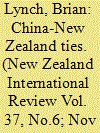

|
|
|
| 2 |
ID:
125365
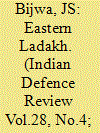

|
|
|
|
|
| Publication |
2013.
|
| Summary/Abstract |
The Armed Forces are India's "hard-power" assets and not a tool for diplomacy on the borders. Deployment of an armed force to support a diplomatic effort is axiomatic as it lends strength to diplomacy. Should "soft power" of diplomacy fail, then the will to suitably demonstrate use of "hard power" must not be found wanting. India is a Nation tugging at its leash to surge forward in all arenas of development. Without throwing caution to winds, there is a requirement to be less tentative and more assertive. India's national interests must be paramount. At stake here are the aspirations of a young generation for a bright progressive future.
"Perform necessary action; it is more powerful than inaction; without action, you even fail to sustain your own body." -Mahabharata
|
|
|
|
|
|
|
|
|
|
|
|
|
|
|
|
| 3 |
ID:
165779
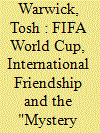

|
|
|
|
|
| Summary/Abstract |
Article Type: Research Paper Purpose:This article explores the evolution of international bonds between Middlesbrough in the northeast of England and North Korea arising from the participation of the North Korean men's football team at the 1966 FIFA World Cup. Shedding new light on the origins of this example of sporting diplomacy, this research seeks to understand the dynamics of international relations enacted at a local level and highlights the role of key individuals and institutions in facilitating this connection between the town and North Korea into the twenty-first century. Design, Methodology, Approach:Beginning with an assessment of early interactions between Middlesbrough and North Korea, this paper analyzes the way in which the relationship has been articulated and developed across several decades. Drawing upon local authority archives, historic newspaper collections, oral history and private collections, this study brings together hitherto underexplored resources, including North Korean diplomatic correspondence and interviews with the footballers of 1966, to deconstruct the multilayered mechanisms, meanings and motivations that underpin the Middlesbrough-Pyongyang relationship. Findings:Focusing chiefly on the role of British agency in North Korea-UK interactions, this research reveals the combination of local sporting conditions, international relations and individual and institution engagement in constructing bonds between Middlesbrough and North Korea since 1966. In doing so, the article draws out some of the peculiar local, economic and political factors that have shaped and nurtured the sporting, pseudodiplomatic connections between Pyongyang and Teesside. Practical Implications:This study highlights the important role that sport can play in harnessing new international interactions and understandings between peoples from different cultural and political systems. The power of football and bonds created at a local level (in this case Middlesbrough) to help nurture international diplomatic relations and embrace common transnational interests is also considered, as are the limitations of what might be considered a strand or extension of sports diplomacy. Originality, Value:Expanding beyond the existing literature on sports diplomacy, mega events and official interactions between North Korea and the UK, this article utilizes hitherto unpublished historical documentation and new oral testimony to bring a new perspective on the benefits and challenges posed by interactions across international borders facilitated by sport, both at the FIFA World Cup in 1966 and in recent decades.
|
|
|
|
|
|
|
|
|
|
|
|
|
|
|
|
| 4 |
ID:
168395
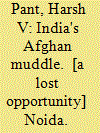

|
|
|
|
|
| Publication |
Noida, HarperCollins Publishers, 2014.
|
| Description |
xiv, 194p.hbk
|
| Standard Number |
9789351362128
|
|
|
|
|
|
|
|
|
|
|
|
Copies: C:1/I:0,R:0,Q:0
Circulation
| Accession# | Call# | Current Location | Status | Policy | Location |
| 059743 | 327.540581/PAN 059743 | Main | On Shelf | General | |
|
|
|
|
| 5 |
ID:
133530
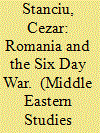

|
|
|
|
|
| Publication |
2014.
|
| Summary/Abstract |
In June 1967, when the Soviet Union and its Warsaw Pact partners decided to break off diplomatic relations with Israel following the outbreak of the Six Day War, it came as a surprise to many that Romania refused to do the same. This paper investigates previously unpublished documents in order to retrace the decision-making process in Bucharest and offer a rational answer to the question: why did Romania choose to ignore Moscow's decision? Was it a demonstration of support for Israel as it appeared at the time and, if so, what were the reasons behind it? Archival insight demonstrates that Romania's decision to maintain diplomatic relations with Israel can best be understood in the general framework of its relations with Moscow. Striving to gain autonomy in the Communist bloc and fight off Soviet domination, Romanian decision-makers preferred to engage in their own analysis of the events in the Middle East before assuming one decision or another. Their conclusions led them to believe that Moscow's policy had been adventurous and to break relations with Israel would have implied confirmation and reinforcement of Moscow's role in the Middle East.
|
|
|
|
|
|
|
|
|
|
|
|
|
|
|
|
|
|
|
|
|